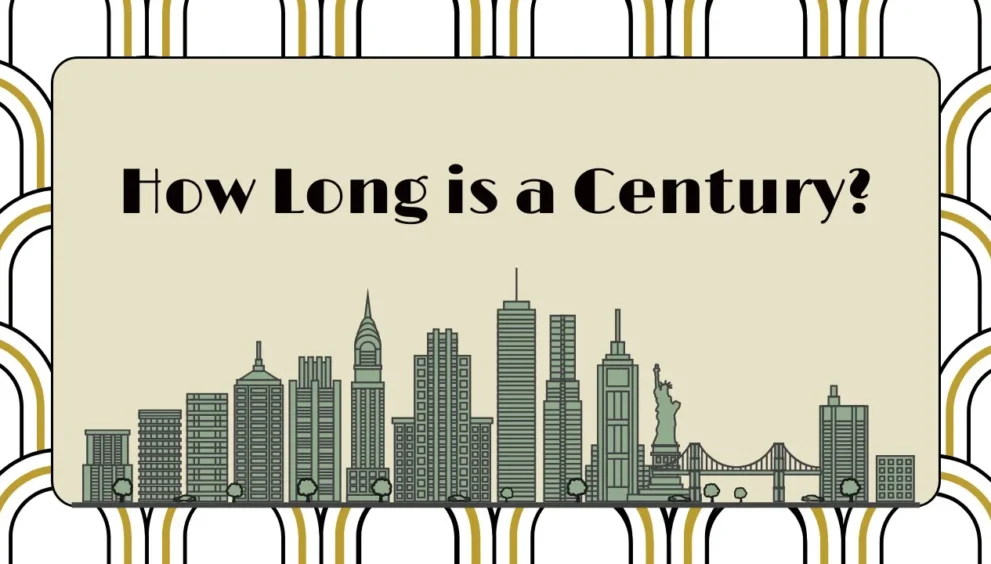How Long is a Century?

A century is a significant time frame that has been used throughout history to mark the passage of time.
Understanding what a century means can help us grasp our history, culture, and the way we measure progress.
In this article, we will explore what a century is, how it is calculated, and its importance in various contexts.
What is a Century?
A century is a period of 100 years. The term comes from the Latin word “centum,” which means “one hundred.” Centuries are commonly used in history, allowing us to categorize events, eras, and cultural changes over significant spans of time.
The concept of a century helps people understand historical timelines better. For instance, the 20th century refers to the years from 1901 to 2000. When we talk about the future, the 21st century will cover the years from 2001 to 2100.
Understanding centuries is essential for learning about world events, such as wars, technological advancements, and social movements. This system of measuring time has made it easier to organize and study history.
How are Centuries Numbered?
Centuries are numbered based on the year in which they begin. The first century started in the year 1 AD and ended in 100 AD.
The second century then followed from 101 AD to 200 AD, and so forth. This numbering can be a bit confusing. For example, the 20th century covers the years from 1901 to 2000, not 2000 to 2100.
When we refer to the current century, we are talking about the 21st century, which started in 2001 and will end in 2100.
Each century is a complete set of 100 years, and understanding this helps us frame historical events and cultural shifts in the right context.
Why Do We Measure Time in Centuries?
Measuring time in centuries provides a clear framework for historians, researchers, and the general public to discuss and analyze events over extended periods.
It helps categorize significant changes, such as political revolutions, technological advancements, and social movements.
For example, understanding the 18th century is crucial for studying events like the American Revolution and the French Revolution.
Similarly, the 19th century is important for discussions about industrialization and colonial expansion.
Each century can mark a distinct phase of human development and cultural evolution. This measurement allows us to grasp how societies evolve over time.
How Do Centuries Impact Our Understanding of History?
Centuries play a crucial role in how we study history. They provide context for significant events and allow historians to connect the dots between different occurrences over time.
For instance, the 20th century is marked by major events like the World Wars, the Cold War, and the rise of the internet.
By examining these events within the century they occurred, we can better understand their impact on modern society.
For example, the technological advancements during the 20th century paved the way for the digital age we live in today.
This context helps historians analyze trends and patterns, making it easier to draw conclusions about the past and its influence on the present.
How Do Centuries Affect Our Daily Lives?
While we may not think about centuries in our daily routines, they influence many aspects of our lives.
For example, the way we celebrate anniversaries and milestones often relates to centuries. Events like the turn of the millennium in the year 2000 were significant cultural moments.
Understanding centuries also affects how we perceive progress. For instance, many people use century milestones to reflect on advancements in technology, health, and culture.
Each century marks a new chapter in human achievement, reminding us of the changes that have shaped our world. This perspective can inspire us to think about what future generations might accomplish in the coming centuries.
Table of Benefits of Understanding Centuries
| Benefits | Description |
| Organizes History | Helps categorize events and understand timelines. |
| Provides Context | Offers insights into societal changes over time. |
| Enhances Learning | Aids in teaching history and making connections. |
| Inspires Reflection | Encourages thinking about progress and achievements. |
| Promotes Cultural Awareness | Highlights significant cultural milestones. |
Conclusion: How Long is a Century?
In conclusion, a century is a period of 100 years that serves as a vital framework for understanding history and societal changes.
By examining how centuries are numbered and their impact on our lives, we gain valuable insights into our past and future.
Understanding centuries not only helps us organize historical events but also encourages us to reflect on the progress humanity has made.
Each century is a building block in our shared history, reminding us of the journey we have taken and the path that lies ahead.
FAQs about Centuries
How long is a century in years?
A century is exactly 100 years long.
What is the current century?
The current century is the 21st century, which started in the year 2001 and will end in 2100.
Why do we count centuries starting from the year 1?
We count centuries starting from the year 1 because there was no year 0 in the Gregorian calendar, which is widely used today.
How do historians use centuries?
Historians use centuries to categorize and analyze events, helping to understand the flow of history and cultural changes over time.
Can a century represent a significant change?
Yes, each century often represents significant changes in society, technology, and culture, influencing how we live today.

































































































